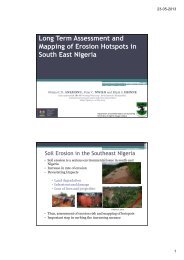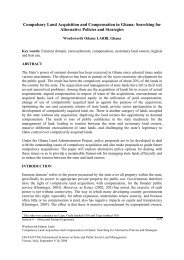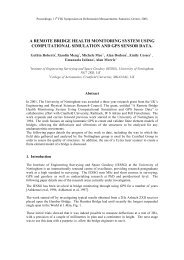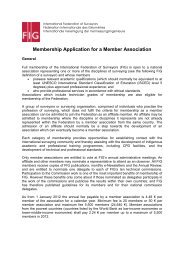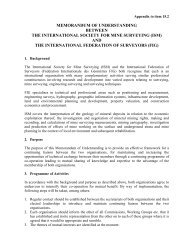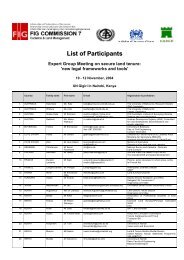Invitation - FIG
Invitation - FIG
Invitation - FIG
Create successful ePaper yourself
Turn your PDF publications into a flip-book with our unique Google optimized e-Paper software.
INTERNATIONAL SCIENTIFIC CONFERENCE<br />
“SPATIAL DATA INFRASTRUCTURES AND SPATIAL INFORMATION MANAGEMENT”<br />
SDI & SIM 2013<br />
13-16 November 2013, Skopje, FYROM<br />
http://conf2013.geo-see.org<br />
the process of spatial data sharing through the Internet, as a tool for faster,<br />
easier and simpler access to spatial data by all stakeholders, customers and<br />
clients; the implementation of International-Global and European criteria for<br />
organizing digital spatial data; the impact of spatial information on all application<br />
fields; cooperation between stakeholders, such as state institutions responsible<br />
for collecting, structuring, archiving, updating and analyzing spatial data,<br />
according to their legal mission and obligation.<br />
Conference themes include (but not limited to):<br />
Spatial Data Infrastructure<br />
1. Sub-national, national, regional, continental and global SDIs<br />
2. Scientific aspects of SDIs and their development<br />
3. Methodologies for SDI development, update and upgrade<br />
4. Technologies and standards<br />
5. Architectures of SDIs<br />
6. Data, data specifications, data organization and exchange mechanisms<br />
and protocols<br />
7. SDI metadata and spatial coordinate systems<br />
8. Building and organization of SDIs<br />
9. Integration, interoperability and compatibility of SDI’s developed by<br />
different platforms<br />
10.Legal aspects of SDI developing and utilization<br />
11.European INSPIRE development and implementation<br />
12.Pan-European geographic datasets<br />
13.Global mapping<br />
14.SDI as necessary tool of cartography<br />
15.Applications of SDI in various sectors such as government,<br />
telecommunications, utilities, cadastre, land management, environment<br />
and nature protection, disaster management, climate changes, Earth<br />
structure, physical and urban planning, tourism and others<br />
16.Education, training and awareness creation<br />
17.Developments of open source SDIs<br />
18.SDIs based on Crowedsourced Volunteered Geographic Information (VGI)<br />
and applications<br />
Spatial Information Management<br />
1. E-government and SDIs: managing information spatially; theory,<br />
applications and best practice studies<br />
2. The significance of reliable SDIs as the necessary tool for managing the<br />
regional and local authorities' services settings, establishing the basis for<br />
their vitality and “openness to change”



